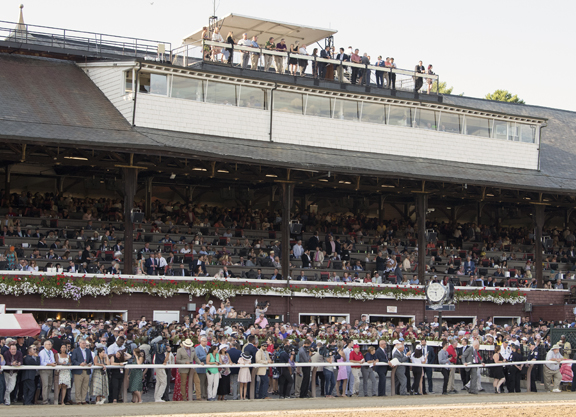By T. D. Thornton
Horseplayers were up in arms last week over a controversial disqualification at previously under-the-radar Fonner Park during a $4.1-million pandemic-inflated Pick Five sequence. Off-the-beaten-path Will Rogers Downs is flirting with
$10 million in weekly handle fueled largely by bettors who, prior to the coronavirus outbreak, would have had difficulty pinpointing that track on a map.
Amid the dystopia triggered by racetrack closures nationwide, such rapt attention and robust wagering on the five Thoroughbred tracks still running (Oaklawn Park, Gulfstream Park, and Tampa Bay Downs are the others) could be viewed as a proverbial silver lining for our industry while the ominous COVID-19 cloud darkens the world.
But it would be a mistake to take those captive-audience horseplayers for granted and expect that their currently voracious capacity for betting and future willingness to attend live races will automatically rise as more tracks get back to business.
This is racing's year of force majeure, not “if you open the gates, they will come.”
And yes, that applies to the toney summer race meets at Saratoga and Del Mar, plus the rescheduled GI Kentucky Derby now penciled in for Sept. 5.
Although horse racing will enjoy an initial advantage over other sports in terms of being able to capably generate at least some revenue by running in front of grandstands that remain empty because of health protocols, the phase that comes after that–reopening races to the public on a limited basis–still looks like a dicey leap into the great unknown.
The big question facing the sport shouldn't be “When will tracks be fully open?” but rather, “Who will come when they are?”
As we approach the four-week mark since the start of widespread social distancing and self-quarantining, most of us are longing for the routine and camaraderie of a day at the races.
It's vitally important for our collective social health to have something like that to look forward to. But the day-at-the-races fantasy starts to break down when you impose the ever-changing “new normal” upon the situation.
Crowding around the walking ring to get a glimpse of the horses? No longer so appealing. Standing 10 deep in a betting line to make a face-to-face, money-exchanging transaction at a mutuel window? No thanks. Or using the fingerprint-smeared touch screen of a self-service betting terminal? You've got to be kidding.
And when tracks do reopen, you can bet that the discarded mutuel tickets that traditionally cover the floor will be joined by those frightfully ubiquitous used vinyl gloves you now see littered everywhere.
A poll conducted Apr. 6-8 by the Stillman School of Business at Seton Hall University revealed that 72% of respondents said they would not attend games if sports leagues resumed play before the development of a coronavirus vaccine. Only 12% said they would take in a sporting event in person if social distancing could be maintained.
The Glens Falls Post Star in upstate New York ran an Apr. 8 story that calculated the cost of a potentially tourism-free summer with no race meet in Saratoga Springs to be a $979-million loss for the area's economy.
Right now, the racing season at the Spa is still slated to open as scheduled July 16. But as one of the owners of the Saratoga Casino Hotel put it bluntly in the Post Star story, “The question is how long, if ever, will we return to [the] same level we had before. It will take a long time because the habits people are forming now–with social distancing and lack of doing things in large groups and venues–won't change immediately.”
With that salient point in mind, what are some of the things that tracks and industry entities could and should be doing to ease the transition?
Coming up with some sort of all-in-one, easy-to-use, on-track mobile app that serves as a track program, betting interface, and food and beverage ordering service would be an enterprising start.
So, too, would lowering takeout rates as a form of economic stimulus.
And even though the numerous calls for “free data” have for the most part fallen on deaf ears at Equibase, now more than ever is the time to underscore the main point that the Thoroughbred Idea Foundation wrote about in a study released almost exactly one year before COVID-19 blindsided our industry:
“The collection and distribution of racing data should be considered a marketing expense, used to attract and retain gamblers while also empowering owners to make educated decisions. It should be as free and open as possible. Equibase's success should not be measured in terms of data sales, but in the performance of racing's wagering markets.”
Jeff Hwang, who covers the gambling sector, wrote an illuminating analysis titled “Why Re-Open the Las Vegas Strip?” that the financial news site The Motley Fool published Apr. 9. It's well worth reading from a Thoroughbred perspective–especially if you substitute “racing industry” for most references that Hwang makes to “Las Vegas,” and “tracks” for most references he makes to “the Strip” (like I have done in brackets for the concluding paragraph of this column).
“This is an excellent opportunity–while the whole planet is closed–to hit the reset button,” Hwang wrote. “This means ditching the nickel-and-dime approach to the customer… There is an opportunity here to reset and reinvent [the racing industry] and fix the mistakes of the past decade, and change our approach to the customer. We do this right–and this starts by not screwing up the coronavirus containment effort locally, and by not forcing [tracks] open before we are ready for visitors–and the customer will come back in due time.”
Not a subscriber? Click here to sign up for the daily PDF or alerts.






